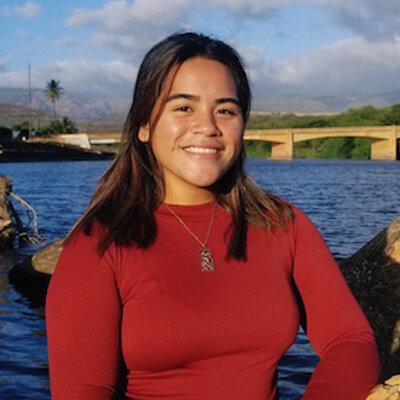Across the globe, countries have acted to address the crisis of cellphone use in schools. From school districts in California to nations such as South Korea, many school systems recognize the harm that unchecked screen use poses to student engagement and learning. In contrast, Hawaiʻi doesn't have a consistent statewide phone policy.
The following editorial was originally published in the Honolulu Star-Advertiser on Sunday, May 2, 2021 as part of the "Raise Your Hand" column in the Insights section.
By: Kahealani Numazawa-Pacanas (Class of 2022) & Mar Heinrich Ruiz (Class of 2023), Waimea High School

Kahealani Numazawa-Pacanas

Mar Heinrich Ruiz
Can Kaua’i be food self-sustaining? This question has recently become popular in the public arena, and as residents of the island, we fully support it. When people think about Hawai’i, they picture white sandy beaches and tourist attractions. However, the outside eye often misses what’s important: the forces that change and impact our communities. A self-reliant Kaua`i would free us from our dependence on the food imports that make up 85-90% of our diet, reviving the importance of self-sustainability.
The west side of Kaua`i has invested in many opportunities to expand local youth’s minds into the agricultural sector. Hawai`i’s schools should follow suit and enact a curriculum that promotes environmental education and awareness, ensuring that students can learn about the history and future of our islands. When people in the community work together, they also create stronger bonds to their culture. In the Kumano I Ke Ala program, people of all ages learn to farm kalo, integrating many different Hawaiian traditions. Kaua`i must remember the importance of sustaining not only ourselves but our communities and Hawaiian culture. Despite these opportunities to connect to land and culture however, there still seems to be a disconnect between generations.
From what we have experienced, many young people have developed the habit of taking the easy way out. Many people feel that our generation both lacks the diligence to work hard and relies on technology to cut corners. I, Kahealani, have been one of these teenagers. I lacked discipline and empathy for others, but by working alongside one of the community’s treasured companies - led by Kaina Makua - I turned my life around. I learned how to care for not only myself, but my family, friends, ‘aina, and so much more. Through these opportunities, youth can find value in hard work. Working towards a self-reliant Hawaii, therefore, will not only provide food for the brain but also for our souls, creating stronger bonds to our fellow Hawaiians, locals, and the land we plant our roots in. Despite this path for the younger generation to be involved in taking charge of their inherited planet, there are nevertheless obstacles in the way of self-sufficiency.
The biggest block to self-sustainability is the increase in the price of produce that would follow decreasing imports. Our local farmers work hard, but the cost of local produce will always be more expensive because of the cost of labor and goods. We need to have patience, it will take time to see the long-term effects of higher prices. However, there are many benefits of self-sufficiency in the long run. For one, we would be supporting our local farmers and businesses, which would keep more money in Hawaii and promote a healthier, cleaner economy. We can use this momentum to come together as a community and create an environment where we thrive off each other.
“The fight to be
sufficient is important
not only on our
Garden Isle but
across our entire state.
This is why youth
voices are crucial. ”
As the future of our home, self-sustainability is a vital part of supporting our land. The fight to be sufficient is important not only on our Garden Isle but across our entire state. This is why youth voices are crucial. When we share personal stories of the value of working our land, we can give others the push
we need to look away from our screens and into the soil. This is a generation of protests and uproar, but we can’t rely on our words to solve problems, we need to take action. Everyone comes from different backgrounds, some harder than others, but it is still crucial that we come together to create the kinds of communities that we are blessed to live in.
Related Articles
When people talk about the dangers of artificial intelligence, many imagine their jobs and decisions taken fromthem by machines. But the more immediate danger looks very different — that we are instead willingly surrendering to AI. The danger of artificial intelligence is not that machines may become conscious, but that people may gradually surrender skills that require independence, patience, soul and critical thinking.
For decades, the concept of patriarchy has defined our social and political discourse, framing the
world as one where men inherently hold the advantage and women are systemically disadvantaged. This narrative, which has played a powerful role in achieving gender equity, remains deeply entrenched in public consciousness.
Amid the relative quietness of Hawaii’s political landscape, the most consequential election of this year is one over 5,000 miles away: the New York City mayoral race. It’s a three-man race among Democrat Zohran Mamdani, Republican Curtis Sliwa and former New York Gov. Andrew Cuomo who is running as an independent.
